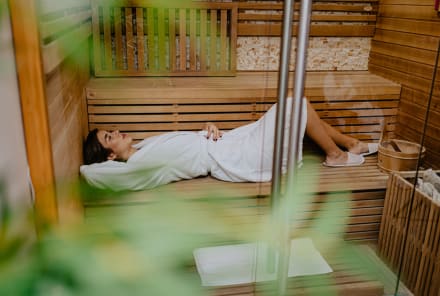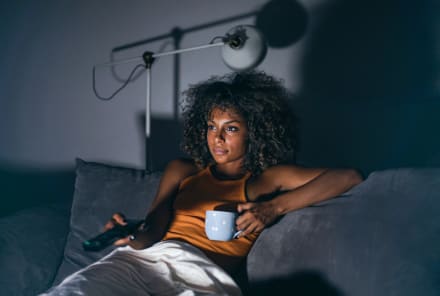Advertisement
8 Tips For Becoming A Morning Person (But Really This Time)


If getting up earlier is on your New Year's Resolution list every single year, you've come to the right place.
It turns out, you might just be setting unrealistic goals for yourself. If you tend to snooze your alarm clock, beg for five more minutes of sleep, and not want to talk to anyone until you've had your first cup of coffee, well, you just may not be a morning person. But that's OK!
Whether you're prone to early rising or like to sleep in may actually depend on your DNA1. And while there's not much you can do about your biology, there are healthy habits you can adopt that will help make mornings a little brighter. Here are eight strategies to try today:
Get a good night's sleep.
When it comes to waking up early, you have to start the night before by getting enough shut-eye. It's not just the amount of time you spend in bed, though, but the quality of the sleep you're getting. Getting your body primed for deep relaxation may mean incorporating some self-care tactics before bedtime and adding a sleep-supporting supplement like magnesium to your routine.* Studies have shown that magnesium supplementation has a positive impact on both sleep quality and sleep duration2.* It works by promoting a sense of calm in the body, relaxing you into a deep and restorative sleep.*
"Treat yourself like a toddler," New York City–based holistic nurse practitioner Victoria Albina, N.P., MPH, says. "I mean it. Take a warm bath or shower (a drop in body temperature as you get out of the water tells your body it's sleep time3). Diffuse calming essential oils like lavender4 and cedar5; take a teaspoon or two of coconut oil right before bed to help stave off blood sugar crashes overnight. Read by candlelight or a salt lamp. Be gentle with yourself."
Keep a steady sleep schedule.
"As basic as it sounds, the body functions optimally when it runs on a predictable schedule," holistic psychiatrist and sleep expert Ellen Vora, M.D., says. "And what's even more boring is that it's best when that schedule involves an early wake-up and sleep time." In fact, anthropological research into the remaining hunter-gatherer societies on earth has found that these groups all seem to naturally go to sleep about three hours after sunset6.
"Interestingly, they're all in various geographical settings," Vora comments, "but all seem to have a community where you may hang out by the fire after sunset, eat dinner, dance, sing, maybe make love, and then it's lights out because historically, it's not safe for humans to be out in the dark."
Vora acknowledges that this early-to-bed, early-to-rise ideal can be easier said than done, but there can be some flexibility in scheduling. "It can vary a bit around the time of the year," she says. "So maybe you go to bed a little later as it gets closer to summer solstice, and then in the winter, we should all be hibernating like bears." Either way, aim to get to bed by around 10 p.m. to optimize your sleep schedule.
Resist the scroll.
"One of the mechanisms that tells our bodies that it's not time for sleep is seeing blue light7," Albina says. "It used to be that the only source of blue light was from the sky. Times have changed, and we're now being exposed to blue light from our phones throughout the evening and night, long after the sun has gone down, when our bodies shouldn't have blue light exposure." 8
The problem with blue light is that it signals the pineal gland in your brain not to put out melatonin8 and thus not to make you sleepy.
"Even with a blue blocker on your phone, scrolling is neuro-excitatory9, and tells your brain that it's time to get revved up. That's the opposite of the signal you want to be sending your body in the evening with a big morning ahead of you!" Albina warns.
"One of the most critical things is getting the phone out of the bedroom," Vora says. "It's a source of blue light and often the last thing we see before bed and the first thing we see when we wake up." On top of that, she cautions, "So much of what's on our phones is stressful, whether it's geopolitical news or work emails or random dings and pings—you don't want those associations to disrupt the quality of your sleep."
Try a gradual wake-up.
"It's optimal to wake up gradually, which is what nature intended," Albina says. "The sun doesn't just pop up out of the sky; it rises slowly, and so should we." When we're awakened quickly, it can create sleep inertia, aka "sleep drunkenness," that potentially painful process of quickly jolting from rest to wakefulness.
As Albina points out, our brains are wired to prefer a slower, steadier transition into the day10. One way to foster that kind of gentleness is to opt for a different kind of alarm—i.e., not the standard, suddenly blaring variety. 11
One study11 from researchers at the Royal Melbourne Institute of Technology found that melodic sounds of songs were strongly linked with less reported sleep inertia, while unmelodic or neutral sounds and songs were linked with more reported sleep inertia. So you may want to consider investing in an alarm that utilizes pleasant sounds or even one that simulates morning light12.
Learn to skip the snooze.
One common sleep mistake that experts advise against (and that so many of us love): hitting the snooze button. "When you hit the snooze button, you're more likely to fall back into a deeper state of sleep," which will make waking up even harder, Albina explains.
"By getting up right when the alarm goes off, you're also training yourself to have healthy sleep habits, and studies show that going to sleep and waking up around the same time daily leaves us feeling more rested overall."
According to Vora, that snooze function isn't doing you any favors, but there is a way to taper usage without going cold turkey. "I think hitting the snooze button is like flushing money down the toilet: No one wins, you don't get good rest or quality sleep, and you still may not get to work on time," she says.
"I recommend getting the phone out of the room and using an alarm clock. Then you can set two alarms: One is the nonnegotiable-latest-wake-up time alarm, and the other is about 10 to 15 minutes before that. That way, you can still get that 'snow day' feeling of, 'oh, I can snooze!' but that second one means business."
Don't pull the blinds.
"If you live in a place where your bedroom is flooded with artificial light overnight, I recommend blinds, curtains, or otherwise making your room as dark as possible overnight," Albina says. Simple enough, right?
It makes sense that artificial outdoor lights13 would have the potential to negatively affect your circadian rhythm (your body's mechanism for controlling the sleep-wake cycle) and that immersing yourself in total darkness could help communicate to your brain and body that it's time to rest.
But then there's that whole issue of waking up. "What's tricky is that if you live somewhere where it's possible to have the sun slowly wake you in the morning without having artificial (and thus, blue) light exposure overnight, then I recommend sleeping without pulling the blinds." And if that's not an option? Investing in a dawn simulation alarm14 can help.
Give yourself something to get excited about.
Whether it's a warm beverage, a great breakfast, or a morning playlist you can't help but dance to, a little morning incentive can help get you going. "If you really enjoy your morning shower, then remind yourself how good you'll feel when the water is hitting your face and back. For some people who get into the groove of meditation, it gives them a little high they can look forward to," Vora explains.
Change your mindset.
"Mindset is everything," Albina says. "When you're lying in bed thinking anxious thoughts about your morning plans, your sympathetic nervous system, the part responsible for fight or flight can get revved up the more you worry and fret. When your sympathetic system gets activated, adrenaline and cortisol are released into your body. These excitatory chemicals will make it much harder to fall asleep and will increase your anxiety and worry as you lie in bed, ruminating on what might be."
And if your internal monologue around rest, sleep, and stress seems automatic, Albina says there are actionable steps you can take to start chipping away at old patterns.
"Instead of running through every possible negative scenario, remember that your nervous system will react to your concerned thoughts with the appropriate chemicals," she says. "Help calm and regulate your nervous system with practices like grounding and orienting. Next, consider focusing on a new thought, like, 'my body will get the rest it needs,' or 'the morning will be exactly what it will be, and I'm doing everything I can to make it wonderful.' Focus on bringing the energy you want in your life into your life versus focusing on the potential negative."
Take-away.
Whether you're a natural early bird or you're a night owl looking to change your ways, implementing everyday strategies to ease into your day can lead to big changes. Just remember, though: Becoming a morning person starts the night before, with solid, sound sleep.
14 Sources
- https://www.nature.com/articles/ncomms10448
- https://www.ncbi.nlm.nih.gov/pmc/articles/PMC3703169/
- https://www.ncbi.nlm.nih.gov/pubmed/15033148
- https://www.ncbi.nlm.nih.gov/pmc/articles/PMC5437114/
- https://www.ncbi.nlm.nih.gov/pmc/articles/PMC5376423/
- https://www.ncbi.nlm.nih.gov/pmc/articles/PMC4720388/
- https://www.ncbi.nlm.nih.gov/pubmed/30311830
- https://www.ncbi.nlm.nih.gov/pmc/articles/PMC4284776/
- https://journals.sagepub.com/doi/abs/10.1177/0956797616645673
- https://www.ncbi.nlm.nih.gov/pmc/articles/PMC5337178/
- https://journals.plos.org/plosone/article?id=10.1371/journal.pone.0215788
- https://www.ncbi.nlm.nih.gov/pmc/articles/PMC270037/
- https://www.ncbi.nlm.nih.gov/pmc/articles/PMC4863221/
- https://www.ncbi.nlm.nih.gov/pubmed/12103471
Watch Next
Enjoy some of our favorite clips from classes
Enjoy some of our favorite clips from classes
What Is Meditation?
Mindfulness/Spirituality | Light Watkins
Box Breathing
Mindfulness/Spirituality | Gwen Dittmar
What Breathwork Can Address
Mindfulness/Spirituality | Gwen Dittmar
The 8 Limbs of Yoga - What is Asana?
Yoga | Caley Alyssa
Two Standing Postures to Open Up Tight Hips
Yoga | Caley Alyssa
How Plants Can Optimize Athletic Performance
Nutrition | Rich Roll
What to Eat Before a Workout
Nutrition | Rich Roll
How Ayurveda Helps Us Navigate Modern Life
Nutrition | Sahara Rose
Messages About Love & Relationships
Love & Relationships | Esther Perel
Love Languages
Love & Relationships | Esther Perel
What Is Meditation?
Box Breathing
What Breathwork Can Address
The 8 Limbs of Yoga - What is Asana?
Two Standing Postures to Open Up Tight Hips
How Plants Can Optimize Athletic Performance
What to Eat Before a Workout
How Ayurveda Helps Us Navigate Modern Life
Messages About Love & Relationships
Love Languages
Advertisement

8 Dietitians Share The Nutrition Advice They Actually Follow
Molly Knudsen, M.S., RDN

Why Women Are Twice As Likely To Struggle With Depression & Anxiety
Phyllis E. Greenberger, MSW

8 Dietitians Share The Nutrition Advice They Actually Follow
Molly Knudsen, M.S., RDN

Why Women Are Twice As Likely To Struggle With Depression & Anxiety
Phyllis E. Greenberger, MSW














